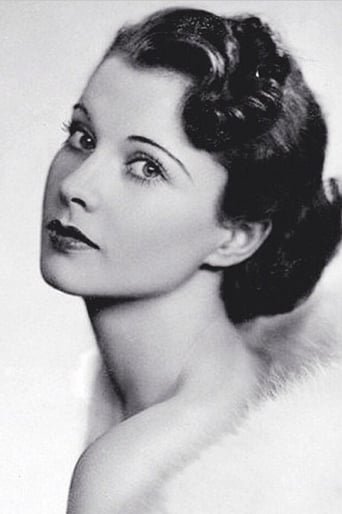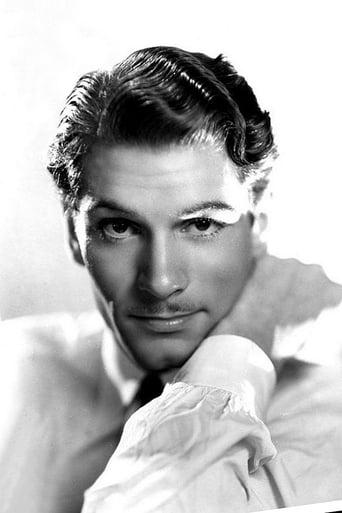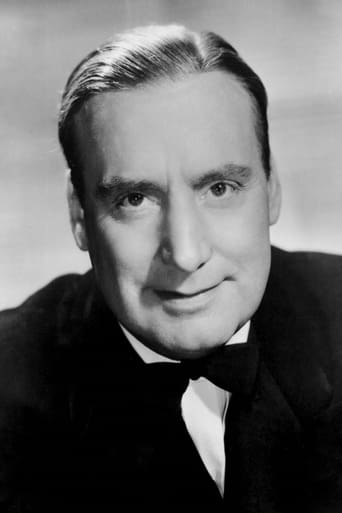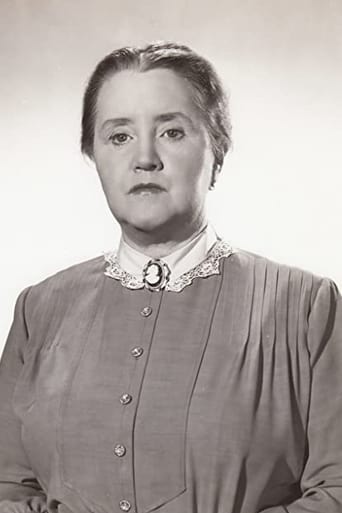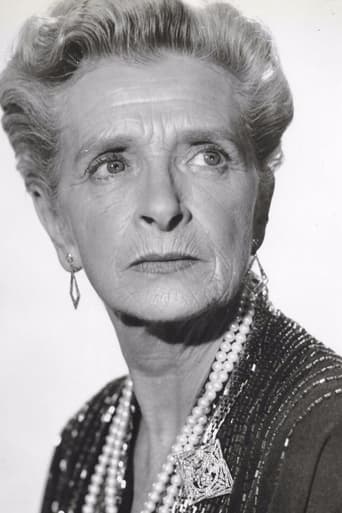Moustroll
Good movie but grossly overrated
Console
best movie i've ever seen.
MoPoshy
Absolutely brilliant
AshUnow
This is a small, humorous movie in some ways, but it has a huge heart. What a nice experience.
lasttimeisaw
Alexander Korda's historical drama pivots on and beautifies the real-life adulterous romance between Emma Hamilton (Leigh), a courtesan-turned-wife-of-British-ambassador and British Vice Admiral Horatio Nelson (Olivier) during the dawn of the Napoleonic war in the beginning of 19th century. First and foremost, it is a star vehicle unflinchingly banks on Leigh and Olivier, the then newlyweds' prestige, then gauging by its release date, it also functions as a patriotic war propaganda urging USA to join the ongoing WWII against the Axis. (which soon would be precipitated by Japan's stealth raid on Pearl Harbor) However, after watching this sketchy account of the scandalous relationship against a very broad historic outline which Korda and his screenwriters have devised, one's natural leaning would tend to be rather ambiguous, Horatio is an out-and-out national hero (Olivier gives a very measured, even somewhat stiff performance which doesn't consonant with his reputation), who devotes his life to fight for the right cause and accrues many victories for his fatherland, which costs him an eye, an arm and eventually his life. Yet, in the end of the day, his country downright fails him, too moralistic to pay due care to Emma, the woman he truly loves, after his untimely demise, not to mention, it is "that woman" who plays a critical role not once but twice (according to the movie's story-line), when Nelson and the Great Britain desperately need aids from Naples, she proves to be much more tactful than her then husband Sir William Hamilton (Mowbray), the British ambassador to Naples. Thus, why would anyone be spurred by this account into laying down one's life in the face of that one's country cannot even promise to safeguard the ones he or she loves ? So, the war propaganda train has gone off-rail, but as a showpiece, Vivien Leigh is utterly ravishing in this tailor-made character, which boils down to her actions, reactions, line-delivery, miens and gestures, are all highlighted with subdued close-ups exude a dainty aura of divinity and desirability, and the story is almost exclusively told through her eye's-view, a young woman unwittingly sold by her dissolute lover to enter a marriage (under which circumstance she caves in) where she is regarded as a precious art collection by her well-off husband, impeccable, forever young but with no love, and for once, the husband, is not a man possessed by the green-eyed monster when Emma finds passion and attraction in another man, an apotheosis of virtues, he can suavely dole out constructive advice to her but never stands in their way. Emma is not a grasping soul, mirrored by the happy-go-lucky temperament of her mother (a jolly and welcomingly earthy Sara Allgood), she isn't craving for William's fortune because she knows she doesn't deserve it, but there is no way Horatio can marry her because Lady Nelson (an animosity-simmering Gladys Cooper) refuses to relinquish her title and gives her blessing to the love birds. At any rate, Emma and Horatio spend their last days together in modest comforts, until he is summoned for the famous Battle of Trafalgar, and for the first time (also the last time), we are steered to the epic sea battle scenery, understandably jerry-built in its studio-bound model conjuring, nevertheless an impressive feat in the eyes of its original audience. As ineffable as Ms. Leigh is, the film itself doesn't pan out as a classical stunner, impeded by its innately episodic narrative, a rash flashback frame and a lackluster co-star, it is best to be served as a scrumptious feast to ogle Ms. Leigh's glamor and glory in her acme, and taking into account of her rather scanty filmography, it might as well sneaks into that must-see list for film lovers all over the world.
James Hitchcock
"That Hamilton Woman" is a dramatised version of the love story of Admiral Horatio Nelson and Emma Hamilton, the wife of the British ambassador to the Kingdom of Naples. Emma Hart (nee Amy Lyon) was a beautiful courtesan who became the mistress first of Sir Charles Greville and then of his uncle Sir William Hamilton, the British ambassador; it is said that Greville effectively "sold" Emma to Hamilton in exchange for assistance with his gambling debts. Despite this unromantic start to their relationship, the much older Sir William fell in love with the lovely young woman and married her. She, however, did not return his love, and when Nelson, then a dashing captain, visited Naples on official business she fell passionately in love with him. In this film the story, as the title might suggest, is told more from Emma's point of view than Nelson's. It opens in 1815, ten years after Nelson's death, with Emma, now ageing and impoverished, living in exile in France. She is arrested in Calais for a petty theft and while in prison tells her life story to a fellow inmate. The rest of the story is then shown in flashback. The film was a controversial one, particularly in the United States, when it first came out in 1941. There were two reasons for this. The first is that it violated the Production Code by showing an adulterous relationship as something romantic rather than something sinful. Emma is played as a romantic heroine rather than a wicked temptress, which is how the cinema of this period normally depicted adulteresses. Nelson's wife Frances is here played by Gladys Cooper as a jealous, vindictive and embittered harridan rather than as patient and long-suffering, which is how the cinema of this period normally depicted wronged wives (and how Lady Nelson seems to have been in real life). Emma is not only a romantic heroine but also a tragic one, a woman who gives her love to Britain's greatest hero but who after his death in battle is shabbily treated by an ungrateful nation and ends her days penniless in a foreign land- ironically, the land against whose forces her lover fought so gallantly. The second reason why the film was so controversial was that it was a quite blatant piece of propaganda. The Napoleonic Wars are seen from the British perspective, as a struggle against a ruthless and tyrannical dictator with ambitions to rule the whole of Europe. The parallels between Napoleon and Hitler are quite deliberate and are underlined by the Churchillian speeches given to Nelson. ("You cannot make peace with dictators. You have to destroy them–wipe them out!") Had the film been made in Britain, this sort of thing would have been par for the course in 1941, but it was actually made in America, albeit by the Hungarian- born Briton Alexander Korda, who acted as both producer and director, with a largely British cast. As America was not yet in the war, Korda was bitterly assailed as a warmongering propagandist by the influential isolationist movement, still blithely oblivious to the very real threat which the Axis Powers presented to their own country. According to one story Korda was summoned to appear before an angry Senate Foreign Relations Committee and was only excused attendance when the attack on Pearl Harbor took place a few days before his scheduled appointment. The two leading roles, Britain's Golden Couple of the 1790s, are played by Olivier and Vivien Leigh, Britain's Golden Couple of the 1940s, , then recently married. (This was the only one of their three films together made after their marriage). Leigh, if anything even more beautiful in 1941 than she had been in "Gone with the Wind" two years earlier, has all the glamour needed for her role, as well as the skill needed to make Emma a sympathetic figure, despite her ambiguous past, and Olivier makes Nelson suitably passionate and daring. There is also a good contribution from Alan Mowbray as Sir William, initially urbane and sophisticated but who later seems small-minded and mean-spirited, caring more for his collection of antique sculptures than for any human being, Emma included. The action scenes of the Battle of Trafalgar are surprisingly well done, given the limited special effects available to film-makers at this period. (Nelson's earlier victories at The Nile and Copenhagen, however, are not shown at all and mentioned only in passing; Korda evidently wanted to save the big show for the end). Seventy-five years on, we need no longer worry about the historical controversies which so exercised people when the film was first made. Today we can see it less as a piece of propaganda than as a fine costume drama. Certainly, it can seem a little melodramatic for modern tastes, but it is nevertheless an excellent example of the style of film-making that was in vogue during this period. 8/10
Alex da Silva
Vivien Leigh (Lady Hamilton) is caught shoplifting and put in a cell where she recounts her life story to Heather Angel. It's a story that reveals her to be the ex-mistress of Laurence Olivier (Lord Nelson) and ex-wife of Alan Mowbray (Lord Hamilton) and it details her romance with the English naval hero up until his death at the 'Battle of Trafalgar'.The film is long but this doesn't seem to matter as the story captures the audience from the beginning. The cast are all good and, apart from the leads of Leigh and Olivier, mentions must go to Alan Mowbray who ends up as an hallucinating wreck and, in particular, Gladys Cooper (Lady Nelson) who holds her dignity and whose every scene is filled with tension.There are some powerful scenes, eg, Vivien Leigh receiving the news of her lover's death, and the film gives you a bit of everything - romance, humour, drama and good actors. It ends rather suddenly - it would have been interesting to know what happens next and what happens to the child - but the story doesn't take things that far. To her, Lady Hamilton's life ends at the battle of Trafalgar.
Jem Odewahn
This film is a must for fans of Laurence Olivier and Vivien Leigh. Made shortly after they married, and before the extra-marital affairs (on both sides) and Leigh's bouts with TB and manic depression, the film is a showcase for their almost-mythical star power. The film itself, directed by Alexander Korda, is a WW2 propaganda piece designed to draw the then-neutral America towards the British cause, and thus made quickly, cheaply and with more emphasis on patriotism and uplifting national spirit than creating a great motion picture. Still, it's an enjoyable film tracing the doomed romance of Lord Nelson (Olivier) and Lady Emma Hamilton (Leigh).Watching Leigh and Olivier in this film is fascinating; the film is one of three the couple made together, and one of the lasting records of this great theater team's work. Leigh is absolutely charming as Emma (this was the role said to be most like Leigh in real life), full of energy and radiance, witty and beautiful. Olivier is rather stiff as Nelson (though the wig, eye patch, missing arm and wounded leg would weigh anyone down a bit), yet he projects Nelson's essential predicament, that of being torn between his love Emma and his love and duty to England, well. The magic of merely watching these two together almost makes the downsides of Korda's film (stitlted camera movements, shooting at the back of his actor's heads when a close-up would have worked much better, a noticeably low budget)insignificant.

